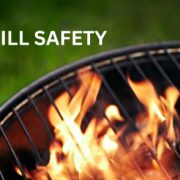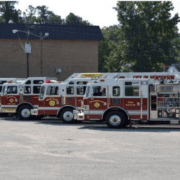Grilling Safety Tips To Remember As Cookout Season Kicks Off
– information courtesy of the National Fire Protection Association
OK, the long holiday weekend is upon us and chances are, your mind has wandered a time or two about weekend activities – how to make the best use of that extra day off from work?
If cookouts and backyard grilling have popped into your head, the National Fire Protection Association has a few reminders to make sure your weekend activities around the grill are safe ones.
“Because outdoor grilling involves the use of a fuel source to generate an open flame, it inherently presents potential fire risks that needs to be taken seriously,” said Lorraine Carli, vice president of Outreach and Advocacy at NFPA.
Between 2017 and 2021, fire departments across the country responded to almost 11,500 fire calls each year that involved grills, barbecues or hibachis.
Of that number, more than 5,700 were structure fires and another 5,600 were simply outside or unclassified fires.
The NFPA has broken down the statistics further to note that May accounts for 12 percent of the grill fires that were reported, and the percentages inch up as the summer progresses. July was the leading month for grilling fires, with 16 percent.
They cause $172 million in direct property damage, killed an average of 2 people each year and injured 176 more.
The U.S. Consumer Product Safety Commission reports that, for the same fire-year period, an annual average of 22,155 patients went to emergency rooms because of injuries involving grills.
Close to half were for burns, both from fire and from contact with hot objects. Children under 5 account for almost half of the close to 3,000 contact-fire burns for that 5-year period.
Adults should supervise closely all children who are close to a grill when it’s in use to avoid them touching, falling or bumping into the hot surface and coals.
“These numbers reinforce that grilling fires can and do happen. However, there’s no need to avoid grilling during Memorial Day or in the months ahead,” said Carli. “Instead, by following simple safety precautions, people can greatly reduce the risk of experiencing a grilling fire.”
See a comprehensive list from NFPA at tips, recommendations, and resources for grilling safely, including these key messages:
- For propane grills, check the gas tank for leaks before use in the months ahead. (Watch NFPA’s video on how to check for leaks.)
- Keep your grill clean by removing grease or fat buildup from the grills and in trays below the grill.
- Place the grill well away from the home, deck railings, and out from under eaves and overhanging branches.
- Always make sure your gas grill lid is open before lighting it.
- Keep children and pets at least three feet away from the grilling area.
- If you use starter fluid when charcoal grilling, only use charcoal starter fluid. Never add charcoal fluid or any other flammable liquids to the fire. When you have or are finished grilling, let the coals cool completely before disposing in a metal container.
- Never leave your grill unattended when in use.


